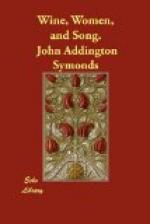X.
The sentiment of love is so important in the songs of the Wandering Students, that it may not be superfluous at this point to cull a few emphatic phrases which illustrate the core of their emotion, and to present these in the original Latin.
I may first observe to what a large extent the ideas of spring and of female society were connected at that epoch. Winter was a dreary period, during which a man bore his fate and suffered. He emerged from it into sunshine, brightened by the intercourse with women, which was then made possible. This is how the winter is described:[15]—
“In omni loco congruo
Sermonis oblectatio
Cum sexu femineo
Evanuit omni modo.”
Of the true love-songs, only one refers expressly to the winter season. That, however, is the lyric upon Flora, which contains a detailed study of plastic form in the bold spirit of the Goliardic style.[16]
The particularity with which the personal charms of women are described deserves attention. The portrait of Flora, to which I have just alluded, might be cited as one of the best specimens. But the slightest shades are discriminated, as in this touch:[17]—
“Labellulis
Castigate tumentibus.”
One girl has long tawny tresses: Caesaries subrubea. Another is praised for the masses of her dark hair: Frons nimirum coronata, supercilium nigrata. Roses and lilies vie, of course, upon the cheeks of all; and sometimes their sweetness surpasses the lily of the valley. From time to time a touch of truer poetry occurs; as, for instance[18]—
“O decora super ora
Belli Absalonis!”
Or take again the outburst of passion in this stanza, where both the rhythm and the ponderous Latin words, together with the abrupt transition from the third to the fourth line, express a fine exaltation:[19]—
“Frons et gula, labra,
mentum
Dant amoris alimentum;
Crines ejus adamavi,
Quoniam fuere flavi.”
The same kind of enthusiasm is more elaborately worked out in the following comparisons:[20]—
“Matutini sideris
Jubar praeis,
Et lilium
Rosaque periere:
Micat ebur dentium
Per labium,
Ut Sirium
Credat quis enitere.”
As might be expected, such lovers were not satisfied with contemplative pleasures:[21]—
“Visu, colloquio,
Contactu, basio,
Frui virgo dederat;
Sed aberat
Linea posterior
Et melior amori,
Quam nisi transiero,
De cetero
Sunt quae dantur alia
Materia furori.”
The conclusion of this song, which, taken in its integrity, deserves to be regarded as typical of what is pagan in this erotic literature, may be studied in the Appendix to Carmina Burana.




